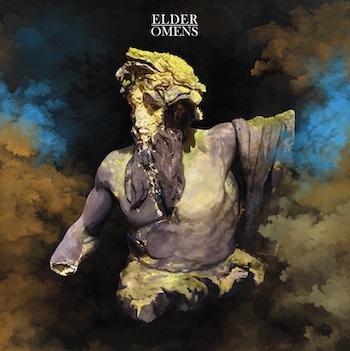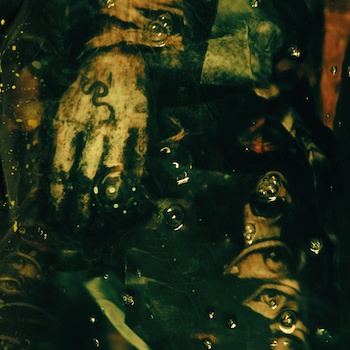Rock Reviews: Heavy Metal Round-Up — Competing Apocalypses
By Scott McLennan
The cumulative message of these heavy metal bands might be: “I see your pandemic, and I raise you one.”
 So, the global pandemic has you on edge, freaking out about catching a potentially deadly virus, worried about economic meltdown, thinking about exactly when and how we will emerge from this catastrophic hole.
So, the global pandemic has you on edge, freaking out about catching a potentially deadly virus, worried about economic meltdown, thinking about exactly when and how we will emerge from this catastrophic hole.
Well, a spate of solid heavy metal records have just been released, and they amplify our collective fears and terrors to hyperbolic proportions. Listened to in the right headspace, this music ends up being exhilarating — if only because it makes our real-world woes seem less overwhelming.
Elder extends its reach with Omens, a record that expands on the band’s sonic range without lessening the weight of this band’s music.
Elder got its start in New Bedford, MA and is now based in Berlin, GER; the troupe’s first two albums won it a national following among fans of rumbling stoner rock. Elder radically upped the ante with the progressive turns it worked into its 2015 album Lore, pulling off the neat trick of winning over prog-rock followers without losing its metal following.
Omens builds on Lore‘s foundation, yet the band sounds fresh while doing it, perhaps because of the presence of new blood. New members, guitarist Michael Risberg and drummer Georg Edert, join up with band founder, guitarist Nick DiSalvo, and longtime bassist Jack Donovan.
Intricate guitar work remains a defining feature of the band’s performances, though on Omens keyboards are prominent in the mix, with Italian pianist Fabio Cuomo adding synth and organ to create a richly layered mix.
The five songs on the release follow a melancholic narrative thread: civilization is in decline. The lyrical content remains more impressionistic than concrete, but the message is clear — this is a vision of halcyon days in decline and tarnished splendor.
Still, even with this dominate theme, the songs are diverse, ranging from the epic “Halcyon” (which feels like three songs rolled into one) to the more straight-ahead rock tune “Embers,” which was a bit confounding when it came out as a single. It suggested that Elder was reining its furies in, but the song fits well within the context of the album.
Elder is by no means the heaviest of bands. But fans of the genre feel the same kind of affection toward it as they did older bands, such as Rush. Elder’s imaginative appeal is its fusion of unapologetic weirdness with guitar overdrive.
 For the satisfactions of purely heavy sounds, head to the latest by Finland’s Oranssi Pazuzu and its album Mestarin Kynsi, “The Master’s Claw” in English.
For the satisfactions of purely heavy sounds, head to the latest by Finland’s Oranssi Pazuzu and its album Mestarin Kynsi, “The Master’s Claw” in English.
Oranssi Pazuzu puts up a huge sound, full of layered synths and guitars. Yet over this texture the band slathers grimy vocals and dynamic rhythms that can swing from industrial precision to chaotic mayhem.
The critical line on Oranssi Pazuzu is that the band combines the ominous style of black metal with psychedelic influences as well as progressive rock. But that abbreviation that doesn’t do justice to the group’s mastery, or how astutely it crafts its songs and performs.
Oranssi Pazuzu fully embraces the claustrophobic soundscapes it creates on Mestarin Kynsi. Vocalist and guitarist Jun-His sings in his native Finnish, but his furious nihilism is universal, conveyed through his guttural rasps and strangled howls. Nobody nowhere is happy in these songs.
The music itself oozes and flows, propelled by various shades of darkness and menace, a hunger for unhappiness that mounts across the entire album. “Tyhjyyden Sakramentti,” for example, develops over the course of nine minutes, starting out as a benign drone accompanied by a steady tempo and ending up as a roiling, orchestral jam. A musical arc you’d normally associate with triumph is subverted into an evocation of terror.
Any one of the six songs on Mestarin Kynsi rewards careful analysis; there’s the pleasures of picking apart the myriad crisscrossing musical elements or just marveling at the audacious transitions within the tracks.
As out there as Oranssi Pazuzu goes, the band plants familiar signposts along the way so, while Mestarin Kynsi is highly experimental, it is also accessible. Of course, once you are lured into these songs, expect your ears and psyche to be forcefully bashed about. But nobody is coming to Oranssi Pazuzu for a dose of easy listening.

The Acacia Strain — musically violent and thematically despondent.
The Acacia Strain, from Chicopee, MA, has been coming up with surprises since its release of the experimental EP It Comes in Waves on Christmas day. That 30-minute blast of its signature death metal and hardcore sound turned out to be a striking meditation on the folly of placing our faith in gods, a session filled with thoughtful sonics and nervy storytelling.
Since then, starting in February, the Acacia Strain has released three singles: one titled “D,” followed by “E” in March, and most recently “C.”
Each of these titles contains two songs, one of which features a guest vocalist joining Acacia Strain front dude Vincent Bennett. Bennett, a notorious malcontent and misanthrope, seemed downright chipper when the Acacia Strain performed in Worcester last fall. But his message in these new songs is as despairing and spiritually enervated as anything this band has delivered since emerging from the metal underground in the early 2000s. The leader, longtime drummer Kevin Boutout, and the newer members of the group sounded reborn when they performed at Worcester’s Palladium. And the latest material makes it clear that they weren’t just riding high on hometown-ish hero status.
These new songs are packed with a brash, thorny musicianship that nimbly supports Bennett’s compellingly bleak missives: “We are the worst versions of ourselves,” the singer howls on “Crossgates” from “C”; “Crippled existence,” he blurts out on “E”’s “Solace and Serenity,” after first intoning, “It’s not the dying that hurts, it’s the waiting to die.” On “Seeing God” from “D,” Bennett lets us know that “We didn’t sell our souls, we gave them away.” All of these tracks are harsh on every level: musically violent and thematically despondent.
Not sure when the Acacia Strain recorded these songs, but the cumulative effect is that the band appears to be saying, “I see your pandemic, and I raise you one.”
Scott McLennan covered music for the Worcester Telegram & Gazette from 1993 to 2008. He then contributed music reviews and features to the Boston Globe, Providence Journal, Portland Press Herald, and WGBH, as well as to the Arts Fuse. He also operated the NE Metal blog to provide in-depth coverage of the region’s heavy metal scene.
Tagged: Elder, heavy metal, Mestarin Kynsi, Omens, Oranssi Pazuzu
